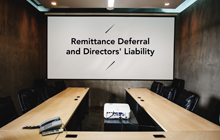Reconsidering Consideration – TCC concludes funding attracts HST in CanLII v The Queen

Bobby Solhi and Braek Urquhart of BLG on the CanLII sales tax implications for non-profit organizations
In The Canadian Legal Information Institute v. The Queen,1 the Tax Court of Canada (TCC) held that the Canadian Legal Information Institute (CanLII) provided a taxable supply of operating an online law library, and that the discretionary funding that it received (the Funding) from the Federation of Law Societies of Canada (the Federation) was consideration for this supply. The TCC confirmed that CanLII correctly charged Goods and Services Tax/Harmonized Sales Tax (HST) on this Funding, and that CanLII was entitled to claim input tax credits (ITCs) to recover the HST incurred in the course of operating the virtual law library. The Crown argued that the Funding was not "consideration" because (a) it was discretionary and (b) CanLII had no legal right to enforce payment of the Funding.
This decision endorses a broad interpretation of "consideration" for HST purposes. Organizations that receive funding or grants to run their operations may, in light of this decision, wish to revisit the HST implications of those payments. More generally, parties may wish to reconsider the implication of this decision to the meaning of consideration in multiparty commercial transactions.
What you need to know
- "Consideration" is the basis for calculating HST liability.
- "Consideration" is a broad concept, which can include amounts that are paid or payable for a supply, even if the supplier has no legal right to that payment.2
- Suppliers may have broader-than-anticipated HST collection obligations in light of this interpretation of "consideration."
- This decision may have a potential upside, as it may unlock non-profit organizations' abilities to claim ITCs to offset HST expenses that were previously considered unrecoverable.
Background
CanLII is a not-for-profit corporation that operates an open-access virtual law library. Access to CanLII's library is free for the public.3 The evidence before the court suggested that mainly lawyers use the library.
The Federation created CanLII. CanLII receives most of the Funding from the Federation. The Federation was required to pay annual levies to CanLII pursuant to a governance agreement (the Agreement) between the law societies and the Federation. The Agreement provided that CanLII would recommend a certain level of Funding each year. The Federation was required to consider this recommendation, but was not required to follow it – the Federation had the discretion to determine how much it would pay CanLII.4 However, once the Federation made such a determination, both the Federation and its Law Societies were bound to follow it.
CanLII charged HST on the Federation Funding it received. CanLII also claimed ITCs to offset the HST incurred on its expenses.5 The Minister audited CanLII and denied CanLII's ITC claims on the basis that CanLII was providing an "exempt supply" instead of a "taxable supply." ITCs are only available to offset HST incurred in the course of making taxable supplies, and the Minister took the position CanLII was providing an exempt supply of free services to the public, pursuant to section 10 of Part VI, Schedule V of the Excise Tax Act (the ETA).6
The issue
The issue was whether CanLII could claim ITCs for the HST paid on its own operational expenses. If the Funding was consideration for a supply, ITCs were available. If the Funding was not consideration for a supply, CanLII was providing an exempt supply (i.e. free access to its virtual library), and ITCs would be unavailable.
The decision
CanLII successfully appealed the Minister's Assessment. The TCC held that CanLII could claim ITCs because the Funding was consideration for CanLII's taxable supply of a virtual library.7 As a result, the Minister's decision to deny CanLII's ITCs was overturned.
Analysis
In order for a supplier to qualify for ITCs, its expenses must be made in the course of "commercial activities" — in the course of making taxable supplies. If "all or substantially all" of CanLII's supplies of virtual library access were for no consideration, CanLII would be making exempt supplies, not taxable supplies, and could not claim ITCs.
The first step of the TCC's analysis examined whether "consideration" requires an enforceable legal obligation to pay. The TCC concluded that consideration only requires the payment be made pursuant to a legal obligation (contractual or otherwise), and it is not necessary for the supplier to be able to enforce this payment obligation.8 The TCC found such a legal obligation in the Federation's by-law and Agreement between the Federation and the Law Societies. Under these two documents, once the Federation determined the amount of Funding to give CanLII for a particular year, the Federation was required to pay that Funding to CanLII, and the Law Societies were required to contribute towards the Funding. As a result, the TCC found that the funding payments were required pursuant to a legal obligation – the fact that the payor had discretion to determine the quantum of the legally required payments was irrelevant.9
The second step in the TCC's analysis examined whether there was a direct link between the legally required payments and the supply, by looking at the circumstances under which the payment was made. This step is required when a payment is made that is not under a contract.10
In examining the facts, the TCC concluded that there was a direct link between the Federation's payments and the supply of the virtual library.11 In particular, the Funding was paid solely to allow CanLII to operate its virtual library. Without the Funding, there would be no virtual library.12
Federation members (i.e. the law societies) greatly benefited from the virtual library, as most users of the virtual library were lawyers.13 Lastly, the TCC cited prior case law for the position that one supply (access to a virtual library) can have multiple recipients (individual users and the Federation).14 The Court stated, "even though someone who pays consideration might be seeking to benefit someone else, the payment is just as much consideration."
As a result, the TCC held that the Funding, which the Foundation legally had to pay to CanLII after determining the Funding amount, qualified as consideration under the ETA.
The Appellant was therefore entitled to charge HST on such funding payments it received, but also enabled the Appellant to claim ITCs to offset the HST it incurred in the course of operating this database.
Takeaways
This decision is important for its broad interpretation of how "consideration" is defined for HST purposes.
CanLII v The Queen is an important decision for any organization that either pays or receives funding or grants. This is especially the case as some current CRA administrative policy on grants and subsidies may be inconsistent with this decision. Such payments may have unanticipated HST consequences if they qualify as "consideration" for HST purposes. For example, non-profit organizations may be required to charge HST on such funding, even if the funding is used to provide goods or services to the public free of charge. Organizations should reconsider whether their treatment of such funds complies with HST law, but also whether such organizations may be entitled to ITCs they are not currently claiming.
CanLII v The Queen is also an important general reminder about the broad definition of "consideration" for HST purposes. Parties should carefully consider their HST obligations when entering into commercial arrangements. For example, assuming obligations as part of an asset purchase transaction, agreeing to share services and cooperate towards a common commercial goal, or even bartering may involve circumstances where the "consideration" (for HST purposes) being paid is much greater than the explicit purchase price or fee being paid.
It remains to be seen whether the Crown will appeal this decision. Notably, the parties proceeded on the basis that CanLII was providing a single service of operating a virtual library.15
Feel free to contact our commodity tax group with any questions you may have about how this decision affects your business.
Footnotes
1 2020 TCC 56 [CanLII].
2 Ibid at para 43.
3 Ibid at para 7.
4 Ibid at paras 10, 47
5 Ibid at para 16
6 Pursuant to Section 10 of Part VI of Schedule V, "exempt supplies" include supplies made by a public sector body if all or substantially all of the supplies are made for no consideration (subject to some limited exceptions).
7 CanLII, supra note 1 at para 60.
8 Ibid at para 43.
9 Ibid at paras 50—51.
10 Ibid at para 52.
11 Ibid at paras 54—56.
12 Ibid at para 54.
13 Ibid at para 56.
14 Ibid atparas 57—58.
15 Ibid at para 27.
Bobby B. Solhi is a partner in the Toronto office of Borden Ladner Gervais LLP. Braek Urquhart is an associate in the Ottawa office of Borden Ladner Gervais LLP.









(0) Comments